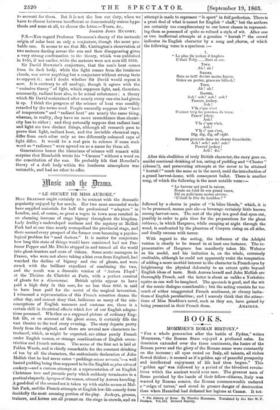usik tht gIntma.
"LB SECRET DE MISS AURORE."
Miss BRADDON ought certainly to be content with the dramatic popularity enjoyed by her novels. Her two most successful works have supplied materials for half the professional " adapters " in London, and, of course, so great a vogue in town soon resulted in an alarming increase of stage bigamy throughout the kingdom. Lady Audley's undeveloped madness and the mystery at Mellish Park had at one time nearly monopolized the provincial stage, and there seemed every prospect of the former even becoming a psycho- logical problem for "mad doctors." It is matter for conjecture how long this state of things would have continued had not Pro- fessor Pepper and Mr. Dircks stepped in and turned all the world into ghost-hunters and seers of visions. Some acute managers in France, who were not above taking a hint even from England, had watched the decline of bigamy and rise of ghosts, and were struck with the brilliant expedient of combining the two, and the result was a dramatic version of "Aurora Floyd" at the Theatre du Chatelet at Paris, with a perfect carnival of ghosts for a ditiouement. British spirits appear to have Paid a high duty in this case, for no less than 8001. is said to have been paid for the secret of the magical invocation. I witnessed a representation of this French sensation drama the other day, and cannot deny that, ludicrous as many of the mis- conceptions of English manners and customs are, there is a certain skill in theatrical effects which few of our English adapta- tions possessed. Whether as a supposed picture of ordinary Eng- lish life, or on account of the ghost scene, it certainly fills the vast theatre to the roof every evening. The story departs pretty freely from the original, and there are several new characters in- troduced, which, as might be expected, are either purely French under English names, or strange combinations of English eccen- tricities and French natures. The scene of the first act is laid at Felden Woods, and is chiefly remarkable for the constant drinking of tea by all the characters, the enthusiastic declaration of John Mellish that he had never eaten "puddings miser arroses,"—a well basted pudding being thus supposed to be the English tie plus ultra of cookery—and a curious attempt at a representation of an English Christmas tree and juvenile party which suddenly terminates in a poetical rhapsody, apropos of the season, uttered by Aurora kneeling. A good deal of the second act is taken up with stable scenes at Mel- lish Park, and the French attempts at English low-life comedy form decidedly the most amusing portion of the play. Jockeys, grooms, trainers, and horses are all present on the stage in crowds, and an attempt is made to represent "le sport" in full perfection. There is a great deal of what is meant for English " chaff," but the authors are certainly too complimentary to our lower classes in represent- ing them as possessed of quite so refined a style of wit. After one or two ineffectual attempts at a genuine "hurrah !" the crowd indicates its English character by a song and chorus, of which the following verse is a specimen ;— 1.
"Le plus fin jockey d'Anglete C'etait Toby fluet et sec.
Toys. Ah ! ah !
DANIEL
Mate sa taill' devint moms lagere, Grace an porter, grace au bifteck ! Toils. Ah! ah!
Rum.
Aoh! aoh ! aoh ! aoh !
Pauvre, jockey.
Aoh !
eque c'est D'aimer trop les pommes de term.
Pauvr' jokey.
Aoh !
c' que &est, Aoh !
VIA c' que &est,
Dig, dig, dig, all right.
REPRISE generale darts un chceur formidable.
Aoh! aoh I aoh! aoh ! Pauvre' jockey ! Aoh ! ttc."
After this ebullition of truly British character, the story goes on, amidst continual drinking of tea, eating of pudding and " Chester " (cheese?), and persevering attempts at the never to be attained " hurrah ! " much the same as in the novel, until the introduction of a grand harvest-home, with consequent ballet. There is another song, of which the following is the most notable verse:— " Le buveur qui perd la raison, Noyde au fond de son grand verve, Dit an polic'rnan moms severe: C'atait la fete du houblon !' "
followed by a chorus in praise of "Is bier° blonde," which, it is to be presumed, means pale ale—a beverage certainly little known among harvest-men. The rest of the play is a good deal spun out, possibly in order to gain time for the preparations for the ghost tableaux, in which Hargrave, while escaping at night through the wood, is confronted by the phantom of Conyers rising on all sides, and finally swoons with terror.
With regard to the acting, the influence of the Adelphi version is clearly to be traced in at least one instance. The re- presentative of Hargrave has manifestly taken Mr. Webster as his model, and his imitation is, on the whole, extremely creditable, although he could not apparently resist the temptation of adding a more morbid interest to the character in French eyes by heightening the physical deformity to an extent quite beyond English ideas of taste. Both Aurora herself and John Mellish are thoroughly French, and the latter is about as unlike a Yorkshire squire as can well be imagined. The spectacle is good, and the wit of the comic dialogue considerable ; but the acting consists far too much of either exaggerated French sentiment, or clumsy imita- tions of English peculiarities ; and I scarcely think that the attrac- tions of Miss Braddon's novel, such as they are, have gained by being presented in their French dress. AMATEUR.






























 Previous page
Previous page